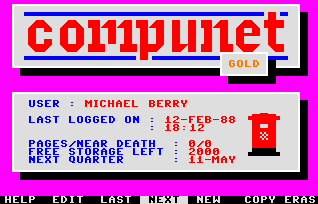Social Media, from the 1980s
 In 1984 Commodore UK launched a service called Compunet. Compunet offered downloads, information pages, electronic mail, bulletin board systems, online gaming and chat rooms. All a UK home user had to do was buy a modem for their Commodore 64, make an adjustment to their phone line and away they went.
In 1984 Commodore UK launched a service called Compunet. Compunet offered downloads, information pages, electronic mail, bulletin board systems, online gaming and chat rooms. All a UK home user had to do was buy a modem for their Commodore 64, make an adjustment to their phone line and away they went.
Compunet also offer users the exciting prospect of teleshopping, telebanking, the buying and selling of real estate, insurance quotes, and much more.
Amazingly, given the recent discussion surrounding Google +1, the Google Panda update, and social media in general, Compunet actually allowed users to vote on content, ala a Facebook Like or a Google 1+. In 1984.
It’s worth noting that the Commodore 64 was the biggest selling Personal Computer of all time (and still is, trouncing Apple into oblivion in the 1980s). Whilst other rival services existed (such as Prestel, which could also be accessed via Compunet), Compunet was the closest you could get to a widespread popular internet like we have today back in 1984.
To access Compunet you had to login, in the same way you have to log into Facebook today before you can access any content internal to that system. Any material, or votes, you made on Compuent were assigned to that specific user ID.
From my distant memory (I was born in 1980) Compunet didn’t have a search function. It had a directory type listings available to find ‘sites’, complete with information on quality content; which downloads had received the most positive votes.
I’d love to show you screenshots of this functionality but I can’t find any and I doubt any still exist today. And no you can’t still connect to Compunet to generate them! Apparently the Compunet server still exists though, hidden away in some dusty room in London slowly decaying away.
‘That it’s all just a little bit of history repeating’
You know, I think Shirley Bassey spoke alot of truth when she sang this line. Whilst the technology delivering ideas today may have improved, much of the’ innovation’ we see in today’s world are based on ideas first formed decades, if not centuries (in the case of 3D) earlier. I think this is true (to an extent) of the Smart Phone, touch screen, tablets, social media as well as a whole host of other technologies.
Of course the latest example of this is Google’s recently announced Google +1, the ability to plus one, or vote on content. Clearly Facebook, Digg, Reddit et al have all got there first in the modern era. Compunet were there in the 1980s. I’m sure if you looked you find something similar much earlier in history.
So what can we and Google learn from Compunet?
Build it and they will… game it
Compunet’s voting system ran into a bit of a problem. Users started banding together and on mass voting for each other’s content in turn! This was both to gain notoriety, as well as win ‘official’ competitions that were being run on Compunet for popular downloads or game demos.
If Google thinks that this won’t happen to their shiny new 1+ system then they are very naive indeed. If Facebook thinks this isn’t already happening on a mass scale across their platform, well…
Social signals are key
Compunet didn’t have a search engine, and it was probably impossible to provide one given the limited computer power they had at their disposal at this time. The core Compunet system was running on a machine with 10 megabytes of RAM, 800 megabytes of hard disk storage with a processor running at 25MHz, a virtual powerhouse at the time.
But none of this mattered. The ability for users to simply vote for their favourite content fair outweighed the lack of a true search function.
Whilst the final implementation today may be more sophisticated, ‘Social Search’ will once again rise to the forefront and be a major factor in how we find information and websites.
Google knows this. And that’s why it’s a little scared. Whilst Facebook can relatively easily build a traditional search engine, Google needs to build an entire social network. The technicalities of this are trivial to Google, attracting users to actually use it though may prove to be a little more tricky…
Web content pricing and platform tie in
Initially Compunet relied on its users to add information to the system. Users had the option of charging other users to access the content they had created if they wished.
Clearly we have seen the slow creep of content pricing appear more and more on the modern web. Whilst users (particular those old school web users) have resisted strongly to this. I’m afraid though this resistance is in vain, paying for content will increasingly become more and more common. This expansion of paying for content will be helped by the proliferation of ‘Apps’ and an increasingly locked down and filtered web tied into the devices we use to access the web. Whilst Compunet tied users into logging into their system (via a Commodore 64) with a reconisable and trackable ID to which all their actions could be associated, the same is increasingly true of our use of Smart Phones and other internet enabled devices.
I hoped you’ve enjoy reading this article as much as I enjoyed writing it. If you can think of any ‘new’ technologies which aren’t exactly new feel free to share them in the comments box below.



No Comments